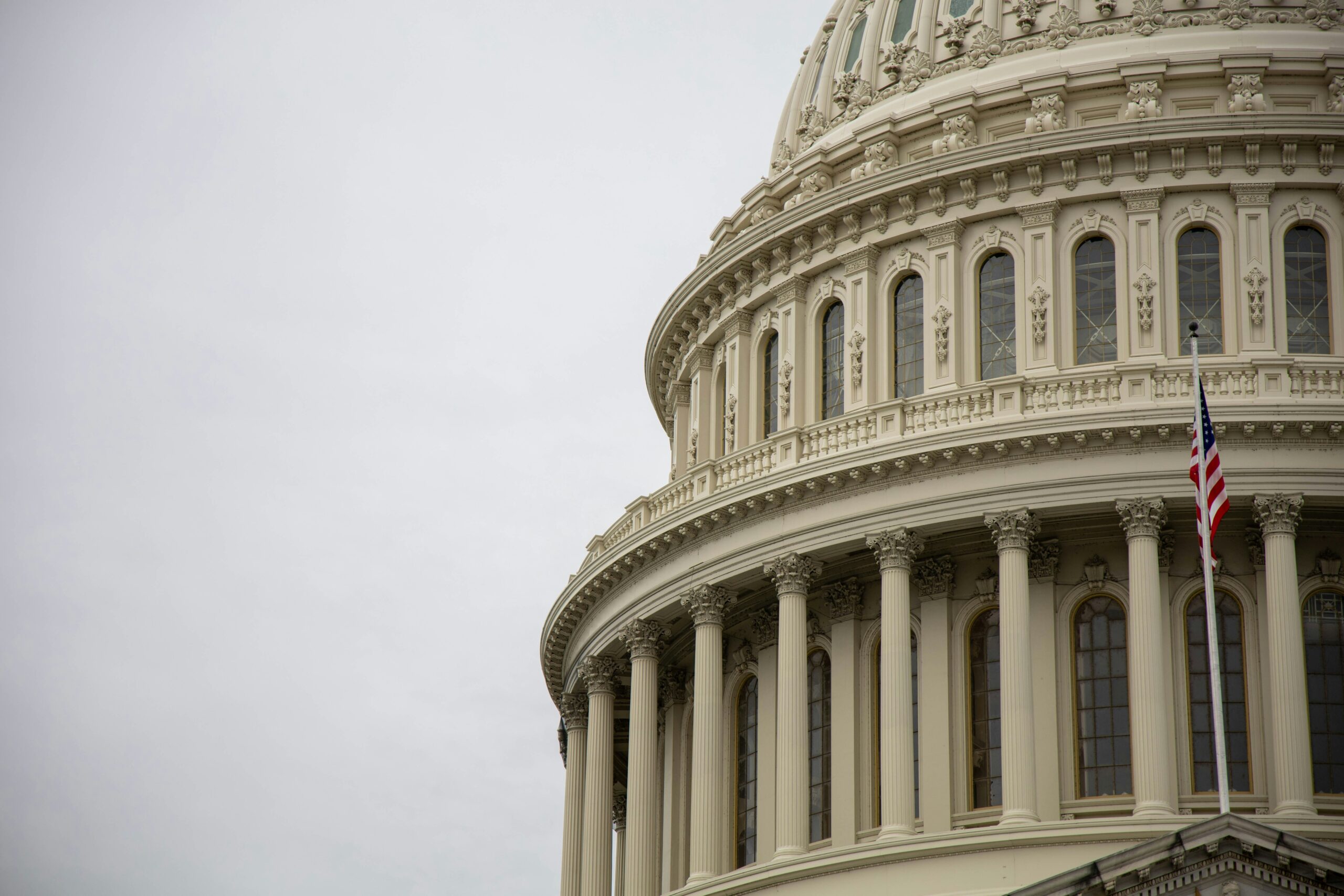Federal Healthcare Attys Look For Exits Amid Trump Upheaval

By Yeji Jesse Lee
Amid President Donald Trump's aggressive moves to slash the federal workforce, government healthcare attorneys are job hunting in the private sector en masse as they look to get ahead of potential layoffs and beat the crowd out the door.
These exit preparations among healthcare attorneys in government are just one part of a major upheaval happening across federal agencies.
Legal industry recruiters say the Trump administration's wide buyout offer; media reports about cuts coming to the Department of Health and Human Services; return-to-work mandates; and a pervasive fear of what's to come are all contributing to a major migration.
Jeffrey Lowe, a partner with CenterPeak LLC and the firm's market president for Washington, D.C., said many government attorneys started to try to find outside opportunities as far back as a year ago.
That number has "cascaded" since then, he said.
"It picked up a lot of steam after the election and, given everything that is going on in Washington now, it's gotten even more crazy,'' Lowe said.
Delivering on a promise to drastically shrink government, the Trump administration in its first weeks has virtually shut down foreign aid agency United States Agency for International Development.
Elon Musk's Department of Government Efficiency, or DOGE, has targeted a series of major agencies, including Centers for Medicare & Medicaid Services, the Consumer Financial Protection Bureau, and the Department of Education.
On Tuesday, Trump signed an executive order requiring federal agencies to coordinate and cooperate with DOGE as the group continues to find ways to reduce the size of the federal government.
Within healthcare, recruiters say job hunting efforts have only been inflamed by the uncertainties surrounding what the Department of Health and Human Services will look like under new leadership.
Robert F. Kennedy Jr., a strident anti-vaccine advocate and frequent critic of federal drug and food policy, could be confirmed as secretary of HHS as early as this week.
If that happens, that could mean major changes to the day-to-day work of lawyers and others across the healthcare workforce, which may lead to more departures in the coming months, recruiters said.
In a post on X in late October, Kennedy said workers at the U.S. Food and Drug Administration who are part of the "corrupt system" should "pack your bags."
He has also called the vaccine division of the CDC "corrupt" and accused it of harming children, according to media reports, though Kennedy denied doing so in recent hearings and said he did not plan to harm the agency.
Lowe said that among healthcare attorneys in government, he's been getting calls
mostly from those in the FDA and CMS. Both agencies would fall under the purview of Kennedy if he is confirmed by Senate lawmakers in the coming days.
While buyout offers and potential policy changes are coming up on calls, Lowe said that for the most part, government attorneys are anxious about the possibility of being forced to leave jobs before they're ready.
"Instead of them getting to make the decision about whether or not they'd like to leave service, they're very concerned that very quickly and suddenly they'll be forced to make a change,'' Lowe said. "They're trying to stay ahead of that potentiality."
Administration changes have always coincided with a period of movement between the government and private sector. But recruiters say the scale of departures they're seeing from government agencies this time around has been unprecedented.
Trump's buyout offer to federal workers - which promises employees their salaries until the end of September if they voluntarily resign - is on pause currently as a federal judge weighs a request from unions to block the program.
Still, around 65,000 employees have taken the proposal, according to the Office for Personnel Management, as public workers grapple with the choice between leaving with a few months of guaranteed pay or staying in their roles and risking a massive overhaul and potential layoffs.
Meanwhile, on Monday a Massachusetts federal judge issued a temporary hold on a Trump administration plan to slash grant funding provided by the National Institutes of Health. HHS could also face massive workforce cuts through a planned executive order, according to a report from the Wall Street Journal, though the Trump administration has denied that such an order exists.
Kevin Merker, co-founder of legal recruiting firm The Merker Group, pointed to two "triggers" so far - the return to office mandate and buyout offers for federal employees - as the key reasons why he's been getting more phone calls in recent months from attorneys looking to return to the private sector.
A potential third trigger for healthcare attorneys could be Kennedy's confirmation, Merker said, adding that once there's more clarity on what a Kennedy-run HHS would mean for employees at the agency, we could potentially see more movement from that group.
Peggy Bennett, a managing director in Washington, D.C., for Macrae focused on healthcare attorneys, said that if Kennedy is confirmed by the Senate, she expects her phone to "ring immediately" with more healthcare attorneys looking to launch into the market.
"I do think that [the confirmation] is going to be a moment for many attorneys within those organizations where they're going to sit and think: Do I want to work in an agency that is going to be controlled by his policies and his directives?" Bennett said. "For some people, RFK is a very polarizing force in healthcare."
But even if folks leave their government posts, they'll have to contend with a massive group of competitors, many of whom are gunning for the same
few BigLaw jobs.
On LinkedIn, Karen Vladeck, founder of legal recruiting firm Risepoint Search Partners, posted that she was getting between 75 and 100 emails daily from government attorneys looking for opportunities in the private sector.
"Many of them are very junior lawyers, a lot of whom haven't even graduated yet but had jobs lined up to start in the fall that are now gone,'' she said in her post.
Merker said recruiters have their work cut out for them.
"The question really for us as recruiters is: How easy is it going to be?" Merker said. "Anytime we've seen there be this influx of a lot of candidates, it becomes harder to place people."
CenterPeak's Lowe said that on phone calls with government attorneys considering buyouts, he tells them they need to understand that if they do take that option, they would be entering a "very tight labor market."
For healthcare attorneys, there are only so many law firms with so many openings for those looking to make the transition from the public to private sector.
Macrae's Bennett said that while she is seeing firms looking to beef up certain parts of their healthcare teams, the most popular candidates for those roles are likely those who have already been in the private sector for quite some time.
"If you are a lateral partner looking to move to another firm and you have a book of business, you'll have a lot of options,'' she said. But it's harder for government lawyers who may have incredible legal credentials but don't necessarily have "firm transferable skills" or the ability to bring in business right away because they've spent years working in government.
"Going back to a firm is most likely not an option for a lot of people, unfortunately,'' said Sarah Van Steenburg, managing director at Major Lindsey & Africa's Washington, D.C., office.
Van Steenburg said that as a result, she's been encouraging people to be "really creative" about what the next step in their career could look like. That could mean moving geographies or potentially considering roles that may take them to a slightly different field, like consulting, she said.
"There are a lot of government lawyers and firms are just going to take very few gambles. The people that they are going to take that gamble on are going to be at the tippy tippy top,'' Van Steenburg said.
"The supply is outstripping demand by multiples at this point,'' she added.
Additional Post




